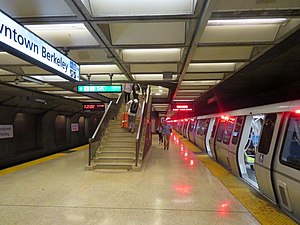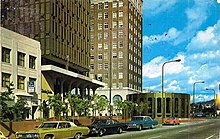Downtown Berkeley station
 Richmond-bound train at Downtown Berkeley in June 2019 | |||||||||||||||
| General information | |||||||||||||||
| Location | 2160 Shattuck Avenue Berkeley, California | ||||||||||||||
| Coordinates | 37°52′11″N 122°16′06″W / 37.869799°N 122.268197°W | ||||||||||||||
| Line(s) | BART R-Line | ||||||||||||||
| Platforms | 1 island platform | ||||||||||||||
| Tracks | 2 | ||||||||||||||
| Connections | |||||||||||||||
| Construction | |||||||||||||||
| Structure type | Underground | ||||||||||||||
| Bicycle facilities | Station | ||||||||||||||
| Accessible | Yes | ||||||||||||||
| Architect | Maher & Martens | ||||||||||||||
| Other information | |||||||||||||||
| Station code | BART: DBRK | ||||||||||||||
| History | |||||||||||||||
| Opened | January 29, 1973 | ||||||||||||||
| Rebuilt | 2016–2018 | ||||||||||||||
| Previous names | Berkeley (1973–1995) | ||||||||||||||
| Passengers | |||||||||||||||
| 2024 | 4,994 (weekday average)[1] | ||||||||||||||
| Services | |||||||||||||||
| |||||||||||||||
| |||||||||||||||
Downtown Berkeley station is an underground Bay Area Rapid Transit (BART) station in the Downtown Berkeley section of Berkeley, California. It is served by the Orange and Red lines.
History
[edit]Southern Pacific
[edit]The Central Pacific Railroad opened its Berkeley Branch Railroad to the intersection of Shattuck and University Avenues on August 16, 1876.[2] Early civic leader Francis K. Shattuck donated land for the railroad and its depot, and subsidized the initial construction.[3] Berkeley was the terminus of the line until 1878, when it was extended northwest along Shattuck. The Central Pacific was leased by the Southern Pacific Railroad (SP) in 1885, then transferred to its Northern Railway subsidiary in 1888.[2] The first Berkeley station was a small wooden building at the northwest corner of Center Street and Shattuck; it was replaced in the 1890s by a slightly larger by still modest station.[3][4]
On October 26, 1903, the Key System began electric commuter rail operation from Berkeley to the San Francisco ferries – a direct threat to the SP's steam-hauled trains – on a line that paralleled the SP tracks on Shattuck.[5] Around that time, Cal president Benjamin Ide Wheeler and other prominent Berkeley academics lobbied SP president E. H. Harriman for an improved train station to complement John Galen Howard's emerging architectural style for the nearby University of California, Berkeley.[3] Finally, the devastating 1906 earthquake and subsequent rebuilding "served as a powerful incentive to expedite the project".[3]
Surveying work began in June 1906; that September, SP management announced their intentions to convert their suburban lines to a frequent electric service to compete with the Key System.[3] The new station, an elegant red brick structure with buff terracotta trim, red tile roof, and a colonnade, opened on April 9, 1908. It was officially designed by SP architect Daniel J. Patterson in a similar style to Émile Bénard's original plans for the university, though the high quality of its design and circumstantial evidence led some historians to believe it was actually designed by Howard.[3] The SP lines were fully electrified in 1911.[5]
BART
[edit]
The BART Board approved the name "Berkeley" in December 1965.[6] The station opened on January 29, 1973, as part of the extension from MacArthur to Richmond.[7] The station was designed by Maher & Martens of San Francisco in collaboration with Parsons Brinckerhoff, Tudor Construction, and Bechtel.[8]
In 1995, BART changed the name of the station from "Berkeley" to "Downtown Berkeley" in an effort to minimize confusion between this station and North Berkeley.[citation needed]
Removal of rotunda
[edit]
A station and plaza renovation project began construction on August 29, 2016[9] and opened to the public on October 19, 2018.[10] The new plaza includes new lighting, landscaping, drainage, paving, and bus shelters in the overground plaza of the station. The old main rotunda entrance has been removed and was replaced by a glass entrance structure similar to those in Downtown Oakland.[11] The $11.2 million project is funded primarily by BART, with additional funding from the City of Berkeley, Metropolitan Transportation Commission, and Alameda County. A further project to renovate the underground station interior is in the planning stages.[12]
The entrances on the southern end of the station were closed from April 13, 2020, to June 12, 2021, due to low ridership during the COVID-19 pandemic.[13] Bathrooms at underground BART stations were closed after the September 11 attacks due to security concerns. The bathroom at Downtown Berkeley station reopened on June 30, 2023, after a renovation, with an attendant on duty during all operating hours.[14]
Station layout
[edit]Like most underground BART stations, Downtown Berkeley has two levels: a mezzanine containing the faregates and an island platform with two tracks. Access to the station is provided by five street-level entrances on Shattuck Avenue, with two at Addison Street and Allston Way each and one at the southwest corner of Shattuck Avenue and Center Street.[15] The escalators at the latter were topped by an 24-sided rotunda featuring artwork of the UC Botanical Garden.
References
[edit]- ^ "Monthly Ridership Reports". San Francisco Bay Area Rapid Transit District. June 2024.
- ^ a b Robertson, Donald B. (1986). Encyclopedia of Western Railroad History: California. Caxton Press. p. 77. ISBN 978-0-87004-385-7 – via Google Books.
- ^ a b c d e f Thompson, Daniella (August 18, 2008). "Berkeley Square: from transport hub to urban core". Berkeley Architectural History Association.
- ^ "Berkeley, Alameda Co., Cal". Charles A. Bailey. 1890 – via Online Archive of California.
- ^ a b "A pictorial history of public transportation in the East Bay, commemorating the achievements of the last century – from the beginning of the first train and ferry service in 1863 to the vast transportation network of today operated by the Alameda-Contra Costa Transit District" (PDF). Transit Times. Vol. 6, no. 5. Alameda-Contra Costa Transit District. September 1963. pp. 17, 26.
- ^ "Names Approved for 38 Rapid Transit Stations Around Bay". Oakland Tribune. December 10, 1965. p. 10 – via Newspapers.com.
- ^ "BART Chronology January 1947 – March 2009" (PDF). San Francisco Bay Area Rapid Transit District. March 2009. Archived from the original (PDF) on October 13, 2013.
- ^ Cerny, Susan (2007). An Architectural Guidebook to San Francisco and the Bay Area. Gibbs Smith. p. 502. ISBN 978-1-58685-432-4.
- ^ Pao, Roann (30 August 2016). "Construction begins on Downtown Berkeley BART station plaza". The Daily Californian. Retrieved 8 February 2017.
- ^ Dinkelspiel, Frances (October 19, 2018). "New Downtown Berkeley BART Plaza opens to fanfare". Berkeleyside. Retrieved October 23, 2018.
- ^ Bay Area Rapid Transit District. "Downtown Berkeley BART Plaza and Transit Area Improvement Project". Retrieved 8 February 2017.
- ^ Bay Area Rapid Transit District. "Downtown Berkeley Station Modernization". Retrieved 8 February 2017.
- ^ "BART opens all entrances/exits that were previously closed due to pandemic" (Press release). San Francisco Bay Area Rapid Transit District. June 12, 2021.
- ^ "BART reopens restrooms at Embarcadero and Downtown Berkeley stations" (Press release). San Francisco Bay Area Rapid Transit District. June 30, 2023.
- ^ "Downtown Berkeley Station map". San Francisco Bay Area Rapid Transit District. Archived from the original on October 8, 2014. Retrieved July 29, 2019.
External links
[edit]- Bay Area Rapid Transit stations in Alameda County, California
- Stations on the Orange Line (BART)
- Stations on the Red Line (BART)
- Buildings and structures in Berkeley, California
- Railway stations in the United States opened in 1973
- Railway stations located underground in California
- Transportation in Berkeley, California

